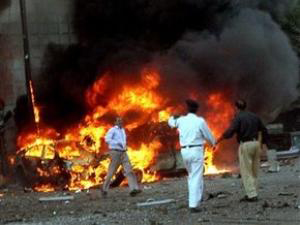Attacks at shrines belonging to Afghanistan's minority Shiite Muslims in Kabul and the northern city of Mazar-i-Sharif killed 62 pilgrims attending a religious festival on Tuesday, Afghan officials said, reported dpa.
A suicide bomber blew himself up at a shrine in Kabul's old city where hundreds of worshippers had gathered to observe the last day of Muharram, a Shiite mourning procession. The shrine is located some 500 metres from the presidential palace.
"The latest report I have says 58 people were killed and more 130 were injured in a suicide attack in Kabul city," " said Mohammad Zahir, the head of Kabul's crime department. Four children and two women were among those killed.
In the northern Mazar-i-Sharif city, a bomb hidden in a bicycle parked near a Shiite shrine went off, killing four people and injuring four others.
The Taliban denied responsibility for both attacks, which it denounced as an "inhuman and un-Islamic act by the enemies of Afghanistan".
"The movement never allows any one to endanger the security of Afghan people in the name of religion, tribe or region," Taliban spokesman Zabiullah Mujahid said in a statement.
Shiite Muslims make up some 20 per cent of Afghanistan's population. Most are members of the Hazara ethnic group.
Under the Taliban regime, which ruled Afghanistan from 1996 until 2001, Shiites were banned from observing Muharram in public and were sometimes attacked by Pashtun members of the Taliban.
But violence between the Shiites minority and Sunni majority has been rare since the fall of Taliban.
Tuesday marks the 10th day of the month of Muharram, when Shiites mourn the death of Hussein ibn Ali, the grandson of the Prophet Mohammed.
The bomber in Kabul disguised himself as one of the mourners, the police said.
"There were body parts scattered around the shrine and I also saw children lying dead," said Hamid, a witness.
Dozens of people rushed to Kabul's hospitals to look for family members and friends killed or wounded in the attack.
Shiite leaders urged calm and unity.
"Why are they killing defenseless Muslims who were mourning in a ceremony? What do they plan to achieve," said Haji Mohammed Mohaqiq, a Shiite cleric.
Seyed Taqdusi, another cleric, said: "The actions of the enemies will not succeed to sow discord Shiite and Sunni Muslims in Afghanistan".
"Both live together peacefully in Afghanistan," he said. "There is no political disagreement between these two sects."
"This is not an attack against Shiites, this is an attack against all Muslims."
The twin attacks, which police said occurred simultaneous, took place a day after an international conference in Germany to discuss the future of Afghanistan.
President Hamid Karzai, speaking in Germany, condemned the attacks as "horrible terrorism".
"This is the first time that on such an important religious day there is terrorism of that horrible nature," Karzai said after talks with German Chancellor Angela Merkel. "We hope a quick recovery to those who are injured".
Kate Clark, an analyst with Afghanistan Analyst Network said the attack was likely to lead to more sectarian violence.
"You see these kinds of attacks quite commonly in Iraq and Pakistan where sectarian attacks are clearly directed at sites where they can cause civilian casualties," she said. "But until now Afghanistan has largely been spared that."
Even though this was an isolated incident, it was "very dangerous and likely to inflame more violence," she said.






